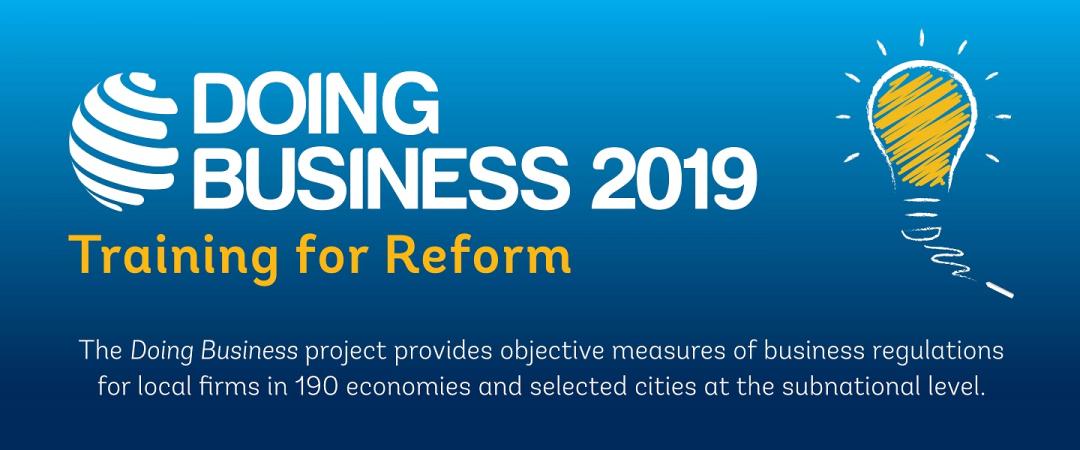
South Caucasus countries in the World Bank doing business report 2020

On 23 October, the World Bank published their “Doing Business” report for the year 2020. Georgia was ranked 7th, Azerbaijan 34th and Armenia 47th amongst the 190 analyzed countries.
The World Bank project, launched in 2002, looks at domestic small and medium-size companies and measures the applicable regulations through their life cycle. Doing Business captures several important dimensions of the regulatory environment that apply to local firms. It provides quantitative indicators on regulation for starting a business, dealing with construction permits, getting electricity, registering property, getting credit, protecting minority investors, paying taxes, trading across borders, enforcing contracts and resolving insolvency. The document also measures features of employing workers.
Georgia was ranked 7th with an overall score of 83.5 points. Georgia made starting a business easier by allowing voluntary value added tax registration at the time of business incorporation. The report read that Georgia and New Zealand had the lowest number of procedures required to start a business. In the field of paying taxes, Georgia made paying taxes easier by levying income tax on distributed profits rather than on taxable profits. At the same time, Georgia made paying taxes more difficult by requiring value added tax to be imposed on advance payments for goods and services. Georgia also improved the reliability of electricity supply by introducing penalties for the utility for having worse scores on the annual system average interruption duration index (SAIDI) and system average interruption frequency index (SAIFI) than the previous year. Georgia also mandated the utility company notify customers of planned electricity outages. It also strengthened minority investor protections by increasing shareholder rights and role in major corporate decisions and by clarifying ownership and control structures. In terms of employing workers, Georgia reduced the maximum duration of fixed-term contracts and introduced a notice period for redundancy dismissals. “Georgia has reached the historical maximum in the World Bank’s ease of doing business rating, however, the US has done slightly more than Georgia at this point, and so they are ahead of us,” said the Georgian Minister of Economy and Sustainable Development Natia Turnava.
Armenia took the 47th place with an overall score of 74.5 points. Armenia made starting a business easier by allowing voluntary value added tax registration at the time of business incorporation. It also made paying taxes easier by extending value added tax cash refunds to cases of capital investment and introducing administrative measures to ease compliance with corporate income tax, value added tax and labour tax rules. Armenia strengthened minority investor protections by increasing disclosure of related-party transactions, clarifying ownership and control structures and requiring greater corporate transparency. The country also strengthened minority investor protections by increasing disclosure of related-party transactions, clarifying ownership and control structures and requiring greater corporate transparency. Armenia made dealing with construction permits easier by exempting lower-risk projects from requirements for approval of architectural drawings by an independent expert and for technical supervision of construction. Armenia also made trading easier by introducing self-declaration desks at customs houses and warehouses, investing in new equipment to improve border operations and introducing a risk management system. The country nonetheless fell 6 places in the ranking in comparison to last year. Central Bank of Armenia chairman Arthur Javadyan said that Central Bank experts have detected an error in the Doing Business Index 2020, which might be a technical error in the ranking related to minority shareholders. According to him, if this error is corrected, the country's position could climb from 47th to 38th place.
Azerbaijan took 34th place with an overall score of 76.6 points and was also included in the Top 20 global reformers in the report. According to the report, Azerbaijan made improvements in areas of registering property, getting credit, protecting minority investors and enforcing contracts. In turn, some restrictions are observed in the area of paying taxes. “Registering property was made faster following the formal mapping and registration of every privately-held land plot in Baku, improving records and speeding up real estate procedures. Minority investor protections were strengthened after liability was imposed on directors for unfair related-party transactions. When commercial disputes arise, parties can now file summons online and receive financial incentives for pursuing mediation,” noted the report. It was also noted that Azerbaijan allowed the general description of debts and obligations as well as out-of-court enforcement of security interests.
New Zealand was ranked first, Singapore second, Denmark third, Hong Kong fourth, South Korea fifth and USA sixth in the ranking. Russia occupied the 28th place, Turkey the 33rd and Iran the 127th place. The countries with the worst rankings were Somalia, Eritrea, Venezuela, Yemen and Libya. The general findings of the report were that the developing economies are catching up with the developed economies in ease of doing business. Still, the gap remains wide. An entrepreneur in a low-income economy typically spends around 50 percent of the country’s per-capita income to launch a company, compared with just 4.2 percent for an entrepreneur in a high income economy. It also read that the least reformed area was resolving insolvency, by putting in place reorganization procedures reduces the failure rates of small and medium-size enterprises and prevents the liquidation of insolvent but viable businesses. In total, 115 economies made it easier to do business worldwide. The economies with the most notable improvement in Doing Business 2020 were Saudi Arabia, Jordan, Togo, Bahrain, Tajikistan, Pakistan, Kuwait, China, India, and Nigeria. Only two African economies ranked in the top 50 on the ease of doing business and no Latin American economies ranked in this group.
See Also


Simonyan: “Armenia Should Trade with Turkey and Azerbaijan Instead of Closing Borders”

Mirzoyan Meets US Deputy Assistant Secretary Joshua Huck

Azerbaijani President Holds Talks with UAE and German Business Delegations on Economic Cooperation

Grigoryan Confirms Armenia’s Readiness to Dissolve OSCE Minsk Group Upon Peace Treaty Signing

